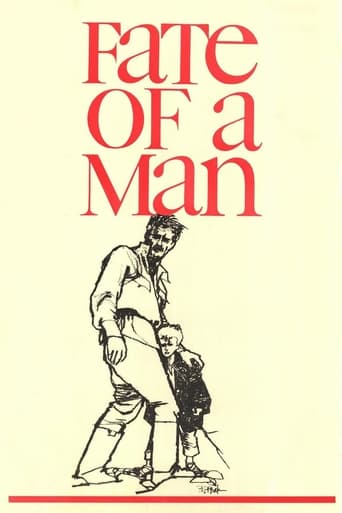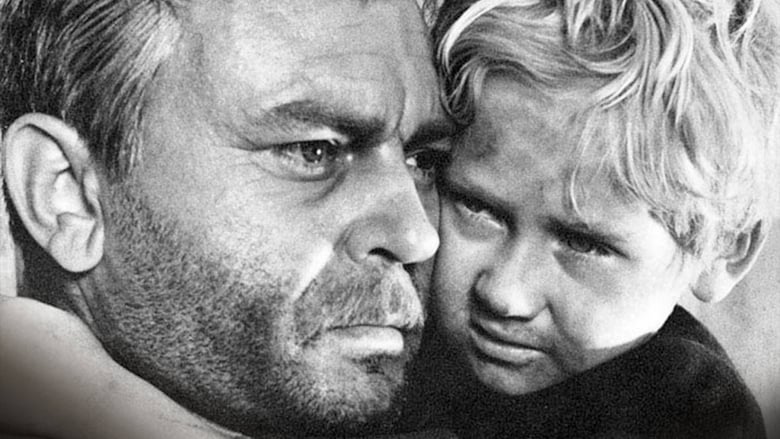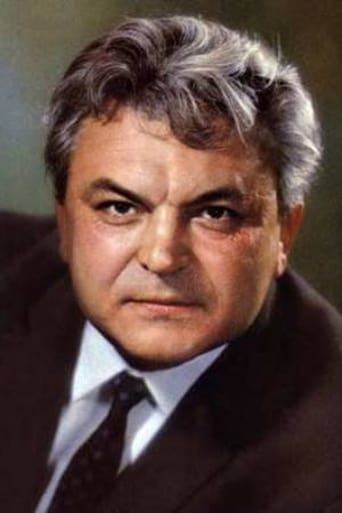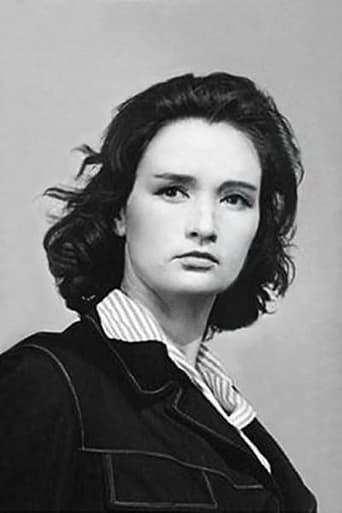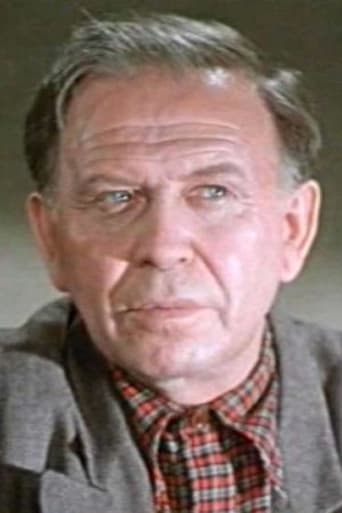Fate of a Man (1959)
The story of a man (Andrey Sokolov) whose life was ruthlessly crippled by World War II. His wife and daughters were killed during the bombing of his village, he spent some time as a prisoner, and his only son was killed in action only a few days before the victory...
Watch Trailer
Cast


Reviews
This is one of the few movies I've ever seen where the whole audience broke into spontaneous, loud applause a third of the way in.
It's the kind of movie you'll want to see a second time with someone who hasn't seen it yet, to remember what it was like to watch it for the first time.
It's the kind of movie you'll want to see a second time with someone who hasn't seen it yet, to remember what it was like to watch it for the first time.
The plot isn't so bad, but the pace of storytelling is too slow which makes people bored. Certain moments are so obvious and unnecessary for the main plot. I would've fast-forwarded those moments if it was an online streaming. The ending looks like implying a sequel, not sure if this movie will get one
Sergey Bondarchuk is probably best known for his epic spectacle "War and Peace" (1966), and his outstanding feature debut "The Destiny of Man" (1959) was made in the same tradition of the war genre, though not in a similarly big fashion. Like many other Soviet war films made during the cultural thaw in Eastern Europe caused by the spirit of Geneva such as "The Cranes Are Flying" (1957) and "Ballad of a Soldier" (1959), "The Destiny of Man" focuses on the human experience in the bleak misery of war. It tells the story of an ordinary man who lost everything during a war that meant nothing to him. The historical legacy and the poignantly present memory of the Second World War played an integral role in almost all of the Soviet films made during the cultural thaw. It is as though life itself was approached from this perspective. An entire generation was left alone with their problems to sink into oblivion in the era of Stalin's cult of personality. Not until the new political waves of the 1950's arrived were these people dealt properly in cinema. "The Destiny of Man" cuts right to the memory of WWII as it begins from the first spring after the war. A man recalls his experiences during the war and ponders why life has mistreated him so in a long flashback. Bondarchuk's mobile camera fluently shifts to the past -- the memory -- revealing its reality before our eyes. His style is very modern, as is the case with other films from this period, born from dynamic movement, montage and intensity of close-ups. Accompanied by an astonishing soundtrack with nearly surreal tones and a great score by Venyamin Basner, this poetic voyage to the days gone by touches our very core. The film was made in the same year with Masaki Kobayashi's masterful trilogy "The Human Condition" (1959-1962) which also highlights the experience and moral disappointment of an individual in times of immeasurable brutality. "The Destiny of Man" also includes a sequence taking place in a POW camp where the prisoners are forced to work, thus inevitably triggering an association with the first part of Kobayashi's trilogy. A perceptive spectator (or an obsessive fan of Kobayashi) might even observe a shot bearing a striking resemblance to the iconic image of workers walking up the hill. What makes "The Destiny of Man" to stand the test of time and lifts it up to the same level with "The Cranes Are Flying" and "Ballad of a Soldier" is its profoundness. It is not a profoundness achieved simply by story, but by form. This can be seen in the film's aesthetics which is tremendously rich of tone and meaning. Bondarchuk truly achieves to depict the complexity of human experience and historical conditions. The cinematic repertoire of the image, the scenes and even entire sequences extends from the brief vibrations of the dramatic surface to the aesthetic profoundness of human existence.
After the Russian Civil War, the Russian worker Andrei Sokolov (Sergei Bondarchuk) marries his beloved Irina (Zinaida Kirienko) and seventeen years later, the couple has a son and two daughters. The family man Andrei is summoned by the Red Army as truck driver in the World War II and he promises to Irina that he will return to his family. Andrei drives through a road that is bombed and he is captured by the Germans and suffers in the prisoner camps. He finds strength to resist the maltreatment of the German soldiers thinking in Irina and his children. Andrei succeeds to escape from the Germans and finds that Irina and their daughters were killed during the bombing of their house and his son Anatoly is a Captain of the Russian Army. Near to the end of the war, Anatoly dies and Andrei does not see any motive to live. Until the day that she sees the starving orphan Vanja begging on the streets of Uryupinsk."Sudba Cheloveka" is a magnificent Russian anti-war film with the nightmarish saga of a survivor of World War II. The narrative is perfect, with top-notch screenplay, direction, performances, cinematography and scenarios. The film gives the sensation of documentary and I am not sure whether the director Sergei Bondarchuk used in his debut inserted footages to give more realism to the movie. The sequence when Andrei meets the orphan boy is touching and never corny and closes this little masterpiece with golden key. My vote is nine.Title (Brazil):"O Destino de um Homem" ("The Destiny of a Man")
I've seen a few Russian war films recently and noticed that they feel more like Hollywood war films . Both THE STAR and 9TH COMPANY suffer from this . COME AND SEE didn't . It was a brutal , unforgettable war film made during the late communist era of the Soviet Union showing the bestial atrocities forced upon the Soviet people . I did have high hopes that being a Soviet film rather than a Russian one DESTINY OF A MAN would show the suffering the Soviets endured from 1941-45 . Does it ? Yes to a degree but there's some faults in the story telling The story is told in flashback by Andrey Sokolov . He is taking his son for a walk in the countryside and meets a man and tells him of his wartime service . Conscripted in to the army as a driver he is captured by the Germans early in the war . He suffers deprivation as he's used as slave labour , sees comrades murdered by the Nazis , comes close death several times . Escapes and makes it back to his own lines where he's treated as a hero . He finds his wife and daughter died during an air raid and as the last days of the war take place his last child , a Red Army officer is killed in the Battle Of Berlin . Devastated Sokolov finds some comfort when he finds an orphan and adopts him as his son It's not a film that has a strong central plot . It is rather episodic but where it succeeds is showing the brutality of the Nazi regime against conquered people . Caputured officers , political commissars and Jews were shot out of hand and as Sokolov finds himself behind Nazi lines there's a scene where people go in to a camp with a large chimney bellowing smoke . The implication is stark and obvious - you enter via the front gate and leave via the chimney Ironically by drawing attention to the murderous intent of Nazism it leaves some plot holes involving Sokolov . He escapes from a forced labour detail and hides in the countryside for four days and is then recaptured . But would the Nazis allow an escaped prisoner to live ? Lkewise a brutal SS camp commander says he's going to execute Sokolov but then changes his mind because Sokolov can hold his drink There's another unlikelihood and that is when Sokolov escapes to the Soviet front lines kidnapping a German officer with important documents and being lauded as a hero , but would this have happened in real life ? It's a forgotten point of history that Soviet prisoners captured during the war would receive little sympathy from their leaders after being liberated . Many of them would be sent on a death march to Soviet gulags . It's disappointing that this aspect is never referred to , especially since Soviet leader Nikita Khrushchev instigated a de-Stalination program in the late 1950s at the time this film was made That said it's very much a humanist type of film showing the triumph of the human will in the face of great adversity and all these type of films suffer from the same flaw . The Japanese film trilogy THE HUMAN CONDITION is similar in some ways . But DESTINY OF A MAN doesn't suffer from the sugary artificial aspects of Hollywood and for that we should be thankful
This movie is very special in many ways. It is a good movie in cinematic terms because it is aesthetically very impressive and has a good plot structure. On the other hand, this film touches subjects that were taboo in the Soviet Union of the time, and bravely shows parts of the history of the war that had not been part of public discourse at the time. It is also unusual because many Soviet films about WWII ended with an upbeat note, unlike this one."Fate of a Man", as the title of the film translates, is a movie about a Soviet man (Sokolov) who experiences many of the horrors of the war against the Soviet Union. The movie tells his story in a flashback, showing how he is very broken after the war and what led to this. He had lost his family in the war, and had fought in it, he witnessed how his Jewish comrades were singled out and killed, and then he was taken to Germany to do forced labor. There, he suffered all sorts of abuse and barely survived. After the war ends, he goes back home, distressed and unable to find comfort for his emotional and physical pain. The film is very subtle in its depiction of the horrors of war, even though it does not white-wash what happened. As it was the first Soviet film to touch the subject of slave labor during the war, and of the murder of the Soviet Jews, it does this carefully, emphasizing the humanity of the victims of these cruel crimes without focusing on the gore. Together with "The Cranes are Flying" and "Ivan's Childhood" this is one of the first Soviet films about WWII that do not have a happy "we won"-type of ending. These three films were a form of dealing with the suppressed pain of Soviet citizens, after having lost one quarter of their population (27mio.) through the brutal attack by the Nazis. This movie is very impressive and very touching as well. I highly recommend it.

